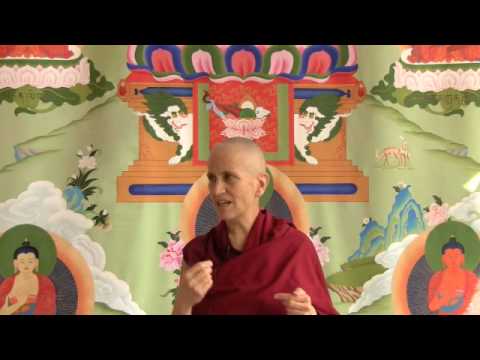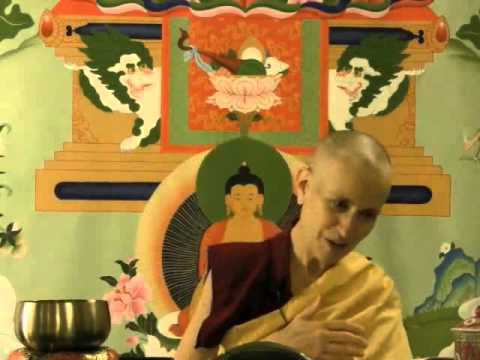Dependent arising: Causal dependence
Part of a series of Bodhisattva's Breakfast Corner talks given during the Green Tara Winter Retreat from December 2009 to March 2010.
- Dependent arising is the king—or queen—of reasonings
- There are different ways of talking about the levels of dependent arising
- Causal dependence is common and fundamental to all Buddhist traditions
Green Tara Retreat 052: Dependent arising and causal dependence (download)
[Responding to written question from the audience]
Someone asks, “In Transforming Adversity into Joy and Courage by Geshe Tegchok,” (which is a wonderful book, I strongly recommend that people read it—it’s published by Snow Lion), “Geshe-la said, ‘When we talk of the person being a dependent arising, there are various levels of dependent arising that can be known, some more subtle than others.’ What are these levels of dependent arising and what is the most subtle one? And, is this a good method to deconstruct the self?”
Yes, this is an excellent method to deconstruct the self. They say that dependent arising is the king or queen of reasonings because by using dependent arising, we not only refute inherent existence but establish conventional existence. Things are dependent arising, so they cannot exist from their own side in and of themselves. But because they dependently arise, they do exist. The dependent part negates inherent existence and the arise part establishes conventional existence.
There are different ways of talking about the levels of dependent arising. One of the common ways is to say causal dependency—dependency on causes and conditions. Another is the dependence on parts. The third is dependence on term and concept. We will talk about this first way of talking about dependent arising, the causal dependence, today. Then tomorrow we’ll go into the other ways of talking about it. This will take us a few days to cover.
The first one of causal dependence is common to all the Buddhist traditions. It is just that: results arise from causes, they depend on their causes. Without a cause, you can’t have a result arise. This is concerning things that are impermanent, that are composites, that are conditioned. It’s not talking about permanent phenomena because they do not depend on causes. Everything else—you, me, everything we see around us—depends on causes and only comes into existence if its causes exist.
This is a real fundamental thing in Buddhism. We see it in the 12 links of dependent arising, which talks about how we get reborn in cyclic existence. How depending on ignorance, then conditioned actions are created—they are conditioned actions. Then the consciousness with the karmic seed arises depending on that. Then we get the rest of the links, and so on, up to aging and death.
That is the typical way of describing causal dependence in Buddhism that is common among all the different traditions and different philosophical schools. It’s really quite potent because if we sit here and we feel so much like, “Well, I am just here.” There is an independent me that sits here. You sit and you go a bit deeper say, “Well, I am only here because the causes of me exist.” Then it is, “What are you talking about? The causes of me? I have causes?” And, “I am only here because the causes exist? No, I’m here independent of causes. I’m here, believe me.”
It’s very interesting, “I’m here only because the causes exist.” What are the causes? We have the 12 links of dependent arising. Those are the causes for why we are here. In another way of looking at it, we have the sperm and egg from our parents that produce the body. We have the continuum of consciousness, one moment following another that produce the mind. In dependence on these two then we label “I” only in dependence on those things.
Especially when we think of I in terms of being a being caught in cyclic existence: “Why am I here?” Ignorance is why I am here. “Why was I born me? Why was I born at all in this kind of body?” Ignorance. Karmic actions. It is quite potent when we meditate in that way. It shocks our usual sense of self.
Question: Are you saying that we only exist because our causes exist? Don’t the causes have to cease in order for the effect to take place?
Venerable Thubten Chodron: Yes, when I said we only exist because our causes exist, I meant that there were causes. The causes ceased and we come into existence because cause and effect clearly do not exist at the same time. If the cause exists, the effect has yet to arise. The cause has to cease for the effect to arise. This way of seeing the person as a causal phenomena actually counteracts the non-Buddhists who assert an atman or some kind of permanent soul that is unconditioned, uncaused. It also counteracts the idea of an absolute permanent creator who was never created, who doesn’t depend on anything else. The whole idea of causality is very basic in Buddhism. If we really penetrate into it, then it becomes very difficult to assert a soul or a permanent creator.
Venerable Thubten Chodron
Venerable Chodron emphasizes the practical application of Buddha’s teachings in our daily lives and is especially skilled at explaining them in ways easily understood and practiced by Westerners. She is well known for her warm, humorous, and lucid teachings. She was ordained as a Buddhist nun in 1977 by Kyabje Ling Rinpoche in Dharamsala, India, and in 1986 she received bhikshuni (full) ordination in Taiwan. Read her full bio.


